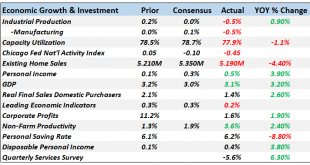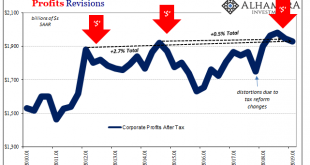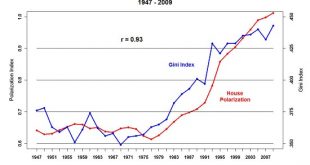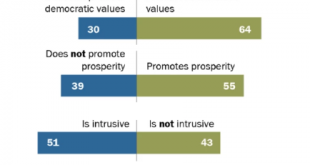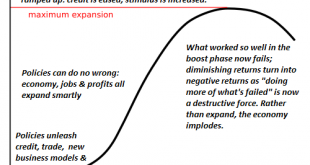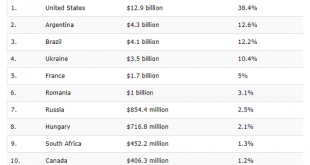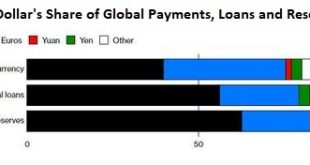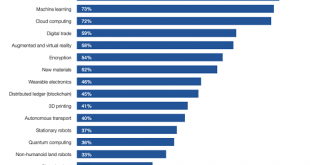Politics as practiced in a bygone era of stability no longer offers any solutions to these profound disruptions. I recently read a fascinating history of the social, political and economic context of the American Revolution: The Radicalism of the American Revolution by Gordon Wood. What is particularly striking is the critical role played by rapid social changes in the mid-1700s. Conventional histories focus on the...
Read More »Monthly Macro Monitor: Economic Reports
Is recession coming? Well, yeah, of course, it is but whether it is now, six months from now or 2 years from now or even longer is impossible to say right now. Our Jeff Snider has been dutifully documenting all the negativity reflected in the bond and money markets and he is certainly right that things are not moving in the right direction. But moving in the wrong direction, even deeply, as we discovered in 2015/16,...
Read More »More What’s Behind Yield Curve: Now Two Straight Negative Quarters For Corporate Profit
The Bureau of Economic Analysis (BEA) piled on more bad news to the otherwise pleasing GDP headline for the first quarter. In its first revision to the preliminary estimate, the government agency said output advanced just a little less than first thought. This wasn’t actually the substance of their message. Accompanying this first revision was the first set of estimates for corporate profits. For the second straight...
Read More »Why Being a Politician Is No Longer Fun
As a society, we are ill-prepared for the end of “politics is the solution.” It’s fun to be a politician when there’s plenty of tax revenues and borrowed money to distribute, and when the goodies get bipartisan support. An economy that’s expanding all household incomes more or less equally is fun, fun, fun for politicians because more household income generates more income tax revenues and more spending that generates...
Read More »Europe Comes Apart, And That’s Before #4
In May 2018, the European Parliament found that it was incredibly popular. Commissioning what it calls the Eurobarameter survey, the EU’s governing body said that two-thirds of Europeans inside the bloc believed that membership had benefited their own countries. It was the highest showing since 1983. Voters in May 2019 don’t appear to have agreed with last year’s survey. For the first time since 1979, Social Democrats...
Read More »Lesson of the S-Curve: Doing More of What’s Failed Will Fail Spectacularly
That nothing is truly “free” will be another lesson of the S-Curve. I often refer to the S-Curve because Nature so often tracks this curve of ignition, rapid expansion, stagnation and decline. One lesson of the S-Curve is that the human bias to keep doing more of what worked so well in the past leads to doing more of what failed even as results turn negative. The dynamic in play is diminishing returns: the yield on the...
Read More »Forget “Money”: What Will Matter Are Water, Energy, Soil and Food–and a Shared National Purpose
If you want to identify tomorrow’s superpowers, overlay maps of fresh water, energy, grain/cereal surpluses and arable land. The status quo measures wealth with “money,” but “money” is not what’s valuable. “Money” (in quotes because the global economy operates on intrinsically valueless fiat currencies being “money”) is wealth only if it can purchase what’s actually valuable. As the world slides into an era of...
Read More »China’s Insurmountable Global Weakness: Its Currency
If China wants superpower status, it will have to issue its currency in size and let the global FX market discover its price. Quick history quiz: in all of recorded history, how many superpowers pegged their currency to the currency of a rival superpower? Put another way: how many superpowers have made their own currency dependent on another superpower’s currency? Only one: China. China pegs its currency, the yuan (RMB)...
Read More »Technology Is Not Just Disruptive, It’s Disastrously Deflationary
Deflation eats credit-dependent, mass-consumption economies alive from the inside. While AI (artificial intelligence) garners the headlines, the next wave of disruptive technologies extend far beyond AI: as the chart of technologies rapidly being adopted shows, this wave includes new materials and processes as well as the “usual suspects” of machine learning, natural language processing, data mining and so on. While...
Read More »Two Intertwined Dynamics Are Transforming the Economy: Technology and Financialization
If you want to understand how the economy is being transformed, look at the intersection of Big Tech, financialization and the central state. The two dynamics transforming the economy–technology and financialization–are intertwined yet widely viewed as unrelated. Critics and proponents of each largely ignore the other dynamic: critics of institutionalized fraud and other manifestations of financialization implicitly...
Read More » Swiss Economicblogs.org
Swiss Economicblogs.org


